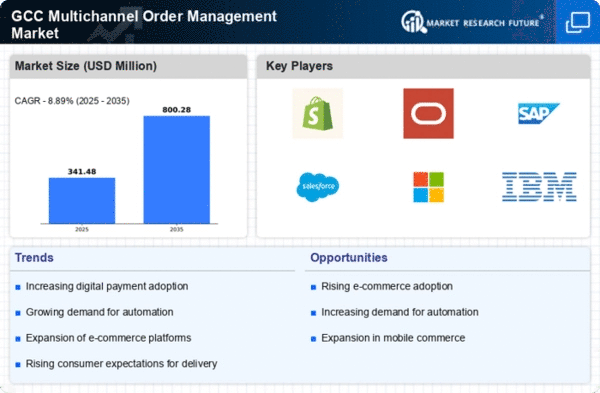Increased Mobile Commerce
Mobile commerce is becoming a significant component of the retail landscape in the GCC, driving the need for robust multichannel order-management systems. With smartphone penetration exceeding 90% in some GCC countries, consumers are increasingly using mobile devices for shopping. This trend is expected to contribute to a projected 25% increase in mobile sales by 2026. Businesses must adapt their order-management processes to accommodate mobile transactions, ensuring a seamless experience across all platforms. The multichannel order-management market is thus positioned to benefit from this shift, as companies seek solutions that can handle the complexities of mobile commerce while maintaining operational efficiency.
Rising E-commerce Adoption
The rapid growth of e-commerce in the GCC region is a primary driver for the multichannel order-management market. As consumers increasingly prefer online shopping, businesses are compelled to adopt multichannel strategies to meet customer expectations. In 2025, e-commerce sales in the GCC are projected to reach approximately $30 billion, reflecting a growth rate of around 20% annually. This surge necessitates efficient order management systems that can seamlessly integrate various sales channels, ensuring timely fulfillment and customer satisfaction. Companies that leverage advanced multichannel order-management solutions are likely to gain a competitive edge, as they can respond more effectively to market demands and consumer preferences.
Regulatory Compliance and Data Security
Regulatory compliance and data security are becoming paramount in the GCC, influencing the multichannel order-management market. As businesses handle more customer data across various channels, they must ensure compliance with local regulations and protect sensitive information. The increasing focus on data privacy is prompting companies to invest in secure order-management systems that can safeguard customer data while facilitating seamless transactions. It is estimated that businesses prioritizing data security can enhance customer trust and loyalty, potentially increasing sales by 10%. This emphasis on compliance and security is likely to drive growth in the multichannel order-management market as companies seek reliable solutions.
Growing Focus on Supply Chain Efficiency
Supply chain efficiency is a vital concern for businesses operating in the GCC, particularly in the context of the multichannel order-management market. Companies are increasingly seeking ways to streamline their operations to reduce costs and improve service levels. The implementation of integrated order-management systems can lead to enhanced coordination among suppliers, warehouses, and distribution channels. Research indicates that organizations that optimize their supply chains can achieve cost savings of up to 20%. As a result, the multichannel order-management market is likely to see increased demand for solutions that facilitate better supply chain visibility and collaboration.
Demand for Real-Time Inventory Management
The necessity for real-time inventory management is a crucial factor influencing the multichannel order-management market. As businesses expand their sales channels, maintaining accurate inventory levels becomes increasingly complex. In the GCC, companies are recognizing that effective inventory management can lead to a reduction in stockouts and overstock situations, which can significantly impact profitability. It is estimated that businesses utilizing advanced order-management systems can reduce inventory costs by up to 15%. This demand for real-time visibility into inventory levels drives investment in multichannel order-management solutions, enabling businesses to optimize their supply chains and enhance customer satisfaction.
















